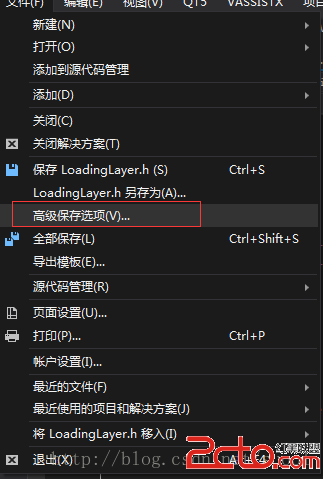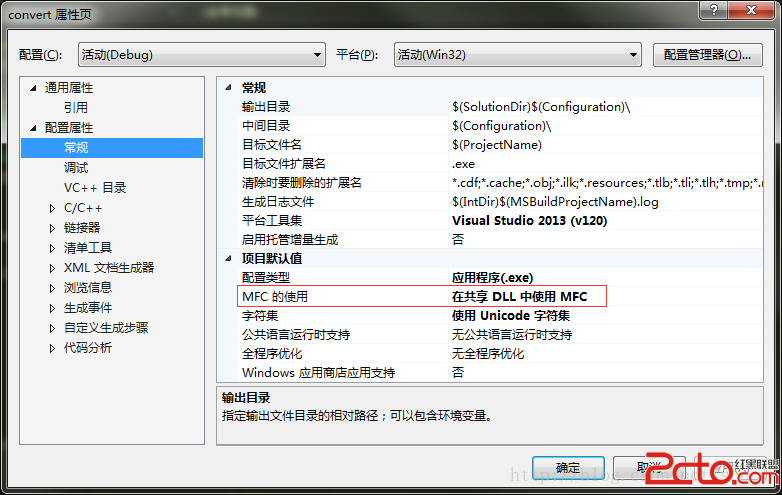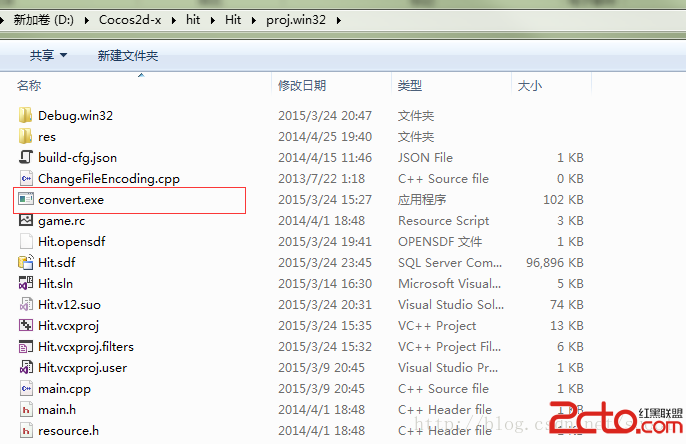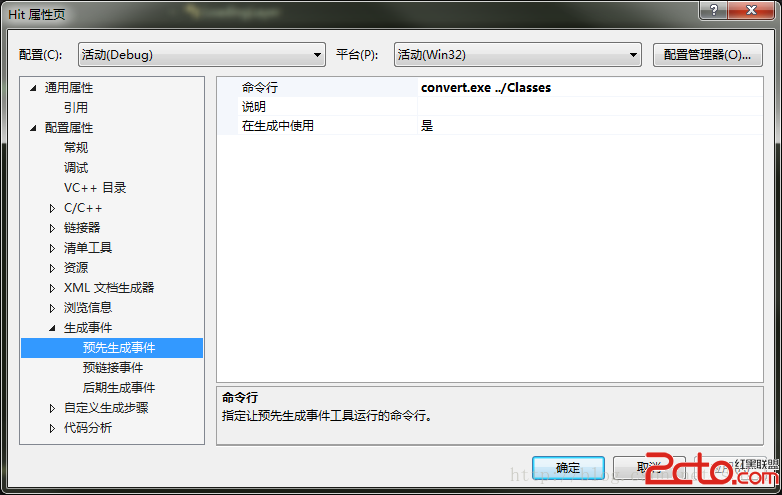在VS下面開發Cocos程序的時候,他的默認編碼是GBK的,但是在遷移或者是編譯調試的時候要求UTF的編碼更為方便。因此便有了將C++文件的編碼格式轉換為UTF-8的需求問題。
這個問題,當然可以在建立文件保存的時候選擇高級保存選擇,然後選擇保存的格式。

但是,顯然,在項目文件很多的時候,這個不是一個聰明的選擇。所以,就要想辦法如何批量的轉化處理。
在Linux下面有專門的命令可以實現這個功能。
在Windows下面要如何做呢?
當然,借助於我們萬能的C++一樣可以很方便的解決它,經過一番查找資料,現在共享一下我的解決方法,首先,要在VS裡面建立一個VC的控制台程序項目。
然後新建一個convert源文件。代碼如下:
// 定義控制台應用程序的入口點。 // #include "stdafx.h" #include #include#include #ifdef _DEBUG #define new DEBUG_NEW #endif #define _CRT_SECURE_CPP_OVERLOAD_SECURE_NAMES 1 // 唯一的應用程序對象 CWinApp theApp; using namespace std; void recursiveFile(CString strFileType); void convertGBToUTF8(CString strWritePath, const char* gb2312); int _tmain(int argc, TCHAR* argv[], TCHAR* envp[]) { int nRetCode = 0; // 初始化 MFC 並在失敗時顯示錯誤 if (!AfxWinInit(::GetModuleHandle(NULL), NULL, ::GetCommandLine(), 0)) { // TODO: 更改錯誤代碼以符合您的需要 _tprintf(_T("錯誤: MFC 初始化失敗\n")); nRetCode = 1; } else { /*for(int i = 0; i < argc; i++) { MessageBox(NULL, argv[i], L"Arglist contents", MB_OK); }*/ //聲明一個CFileFind類變量,以用來搜索 //接受一個參數作為源代碼文件的根目錄 TCHAR *lpszDirName = argv[1]; CString strFileType; strFileType.Format(_T("%s\\*.*"), lpszDirName); //遞歸此目錄下的.h文件和.cpp文件,如果發現不是utf8編碼則轉換為utf8編碼 recursiveFile(strFileType); } return nRetCode; } void recursiveFile(CString strFileType) { CFileFind finder; BOOL isFinded = finder.FindFile(strFileType);//查找第一個文件 while (isFinded) { isFinded = finder.FindNextFile(); //遞歸搜索其他的文件 if (!finder.IsDots()) //如果不是"."目錄 { CString strFoundFile = finder.GetFilePath(); if (finder.IsDirectory()) //如果是目錄,則遞歸地調用 { CString strNextFileType; strNextFileType.Format(_T("%s\\*.*"), strFoundFile); recursiveFile(strNextFileType); } else { //如果是頭文件或cpp文件 if (strFoundFile.Right(4) == _T(".cpp") || strFoundFile.Right(2) == _T(".h")) { CFile fileReader(strFoundFile, CFile::modeRead); byte head[3]; fileReader.Read(head, 3); //判斷是否帶有BOM文件頭 if (head[0] == 0xef && head[1] == 0xbb && head[2] == 0xbf) { fileReader.Close(); continue; } fileReader.SeekToBegin(); int bufLength = 256; char *buf = new char[bufLength]; ZeroMemory(buf, bufLength); int nReadLength; std::string strContent; while ((nReadLength = fileReader.Read(buf, bufLength))) { strContent.append(buf, nReadLength); ZeroMemory(buf, nReadLength); } delete buf; fileReader.Close(); convertGBToUTF8(strFoundFile, strContent.c_str()); TCHAR* fileName = new TCHAR[strFoundFile.GetLength() + 1]; //wcscpy_s(*fileName, strFoundFile); // 中文路徑存在問題,可以將下面的輸出屏蔽,程序將靜默運行 printf("%S已經轉換為UTF-8編碼", strFoundFile.GetBuffer(0)); cout << endl; if (_tcslen(fileName) >0) { delete[] fileName; } } } } } finder.Close(); } void convertGBToUTF8(CString strWritePath, const char* gb2312) { CFile fp; fp.Open(strWritePath, CFile::modeCreate | CFile::modeWrite | CFile::typeBinary, NULL); int len = MultiByteToWideChar(CP_ACP, 0, gb2312, -1, NULL, 0); wchar_t* wstr = new wchar_t[len + 1]; memset(wstr, 0, len + 1); MultiByteToWideChar(CP_ACP, 0, gb2312, -1, wstr, len); len = WideCharToMultiByte(CP_UTF8, 0, wstr, -1, NULL, 0, NULL, NULL); char* str = new char[len + 1]; memset(str, 0, len + 1); len = WideCharToMultiByte(CP_UTF8, 0, wstr, -1, str, len, NULL, NULL); if (wstr) delete[] wstr; str[len] = '\n'; const unsigned char aryBOM[] = { 0xEF, 0xBB, 0xBF }; fp.Write(aryBOM, sizeof(aryBOM)); fp.Write(str, len); delete[] str; fp.Close(); }
如果編譯出現錯誤請點擊,項目--屬性--一般------MFC的使用選擇共享DLL的方式。

然後將編譯成功的.exe文件放在項目的目錄下,比如:

然後選擇項目,屬性的與生成事件,將要轉換的源碼目錄放在.exe 的後面即可,這樣雖然在您編寫的時候保存的是GBK,但是在項目進行編譯之前會把指定目錄下的所有C++源碼文件轉換為UTF-8的格式,具體格式如下:

當然,您也可以直接在cmd中運行該exe文件,在後面加上要轉換的目錄即可。格式為: convert.exe Dir
當然使用Python寫個腳本來轉換也是可以的。這個問題要解決還是有很多的方法的。
That's all.
希望有幫助到您。